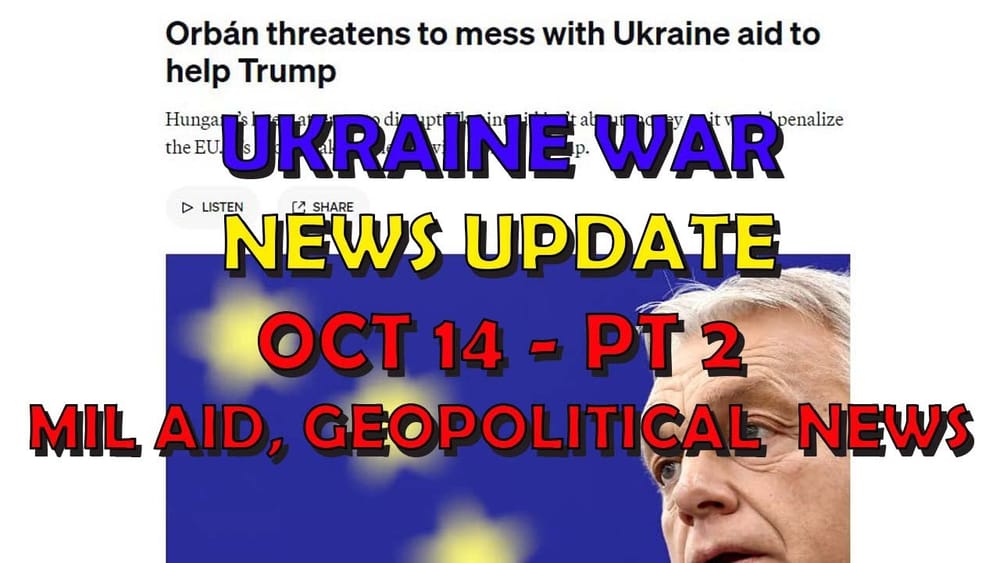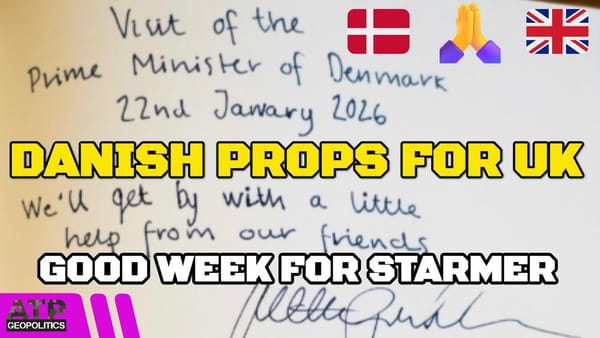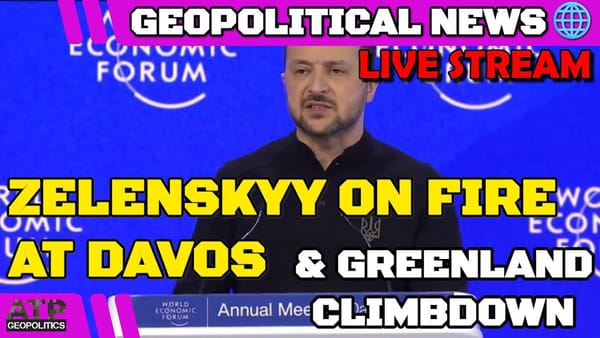Ukraine War Update NEWS: Military Aid & Geopolitical News
Table of Contents 📖
"If you still believe supporting Donald Trump is the right thing to do for Ukraine, then Viktor Orban might have a word with you."
Hello Team
🎦 00:00-00:21⏩
Jonathan introduces the video as the second part of the Ukraine War News Update for the 14th of October 2024, focusing on military aid to Ukraine, Russian military actions, and the geopolitical landscape of the war.
Return to top⤴️
Ramstein Meeting Postponed Indefinitely
🎦 00:21-00:31⏩
- The Ramstein meeting, where international leaders discuss aid to Ukraine, has been postponed indefinitely.
Biden's Visit to Germany Shortened
🎦 00:31-00:41⏩
- US President Biden's planned visit to Germany on October 17th, initially delayed due to Hurricane Milton, will be significantly shortened to a single day due to campaign commitments.
Ukraine Secures More Weapons Pledges
🎦 00:41-01:20⏩
- Ukrainian Defence Minister Oleksii Reznikov confirms additional weapons pledges following a European tour with President Zelensky.
- The UK has promised more long-range weapons, while France is considering a training centre for Ukrainian drone operators.
- The EU will allocate €440 million to support Ukraine's defence industry, including direct arms purchases.
Ukraine's Victory Plan Revealed: More Storm Shadows and ATACMS
🎦 01:20-02:27⏩
- Ukraine's victory plan, soon to be released publicly, requests an increased supply of Storm Shadow and ATACMS missiles, along with permission to target Russian military assets within Russia, according to Mykhailo Podolyak, an advisor to President Zelensky.
- Jonathan expresses uncertainty about whether MBDA, the manufacturer of Storm Shadow, would ramp up production, particularly as the missile is due for replacement.
Estonia Explores Defence Cooperation with Ukraine
🎦 02:27-03:58⏩
- Estonian Defence Minister, Hanno Pevkur, reveals discussions about potential defence cooperation, with Estonia possibly buying defence products from Ukraine.
- However, martial law in Ukraine currently prohibits arms exports.
- Jonathan highlights the dilemma Ukraine faces: balancing the need for domestic production with potential profits and industry growth through exports.
- He suggests a compromise where Ukraine could export surplus equipment while prioritising domestic needs, using profits to reinvest in manufacturing essential items.
France Considered Sending Rafale Jets to Ukraine
🎦 03:58-04:51⏩
- French media outlet Le Monde reports that the French government considered transferring its entire fleet of Rafale fighter jets to Ukraine.
- Defence Minister Sébastien Lecornu ultimately rejected the proposal, opting instead to supply Mirage jets by 2025.
Australia Criticised for Lack of Support to Ukraine
🎦 04:51-07:26⏩
- Retired Australian General Mick Ryan, whose work Jonathan frequently references, highlights an Australian Senate report on support for Ukraine.
- The report praises the report, which identifies Ukraine's needs and Australia's ability to help.
- Public support for Ukraine remains strong in Australia, with 86% backing sanctions on Russia, 80% supporting Ukrainian refugees, and 74% in favour of military aid.
- However, the Kiel Institute tracker shows Australia lagging in GDP percentage spent on Ukraine assistance.
- The report includes 22 recommendations for the Australian government, covering aid coordination, quantity, types of military assistance, prioritising Ukraine in equipment disposal, reopening the Australian embassy in Kyiv, and more.
- While Australia has acted on one recommendation, providing a pathway to citizenship for Ukrainian refugees, the other 21 remain unaddressed.
- Sending Australia's decommissioned M1 Abrams tanks to Ukraine is among the urgent decisions.
- Jonathan echoes the report's call for increased humanitarian aid, especially for the approaching winter.
- Jonathan shares a link to General Ryan's full analysis on his Substack, Futura Doctrina.
- Jonathan expresses his frustration with Australia's inadequate response, urging them to "step up."
German Opposition Leader Signals Potential Shift on Taurus Missiles and Long-Range Strikes
🎦 07:26-08:55⏩
- Friedrich Merz, leader of Germany's Christian Democratic Union (CDU) and likely next Chancellor, suggests Germany could supply Taurus missiles and lift restrictions on long-range strikes into Russia if Moscow continues bombarding Ukrainian civilians.
- This represents a significant potential shift in German policy, as they have so far resisted providing long-range weapons.
- Jonathan emphasises the importance of setting red lines and controlling the narrative in the conflict, rather than constantly reacting to Russian actions.
US Defence Official: Ukraine Aid Strengthens US Strategic Readiness for Potential China Conflict
🎦 08:55-14:32⏩
- Jonathan plays a clip from February 2024 featuring US Assistant Secretary of Defence Eli Ratner addressing the US Congress.
- Ratner argues that supplying Ukraine benefits US strategic readiness and bolsters the US defence industry, preparing it for a potential future conflict with China, which remains the primary concern in the US National Defence Strategy.
- He highlights that the 2024 defence budget is the "most strategy driven" ever, aligning with their national defence strategy, which prioritises China as the pacing challenge.
- Ratner emphasises that the conflict in Ukraine is providing valuable insights for the US regarding China, both in terms of deterring Chinese aggression and preparing for potential conflict.
- He argues that the war has highlighted the need to strengthen the US defence industrial base, which is a key element of the national security supplemental budget being debated in Congress.
- Jonathan underscores the need to communicate this message effectively to the American electorate, particularly Republican voters, demonstrating that supporting Ukraine aligns with US strategic objectives against China.
US Defence Official: Ukraine Conflict Shows How Smaller Powers Can Deter Larger Ones
🎦 14:32-16:36⏩
- Continuing the discussion with Assistant Secretary Ratner, Jonathan highlights how Ukraine's performance demonstrates how smaller nations can effectively resist larger military forces through asymmetric capabilities.
- Ratner adds that the international coalition's response to the war, showcasing military, economic, and diplomatic unity among advanced democracies, sends a strong message of deterrence to autocratic regimes.
- He states that the US Department of Defence is analysing the operational lessons from Ukraine, identifying elements relevant to potential conflicts in the Indo-Pacific region and other emerging forms of warfare.
- Jonathan stresses the significance of Ratner's points to counter arguments that supporting Ukraine detracts from US readiness for a potential conflict with China over Taiwan.
US Defence Official: Indo-Pacific Leaders View Ukraine as Strategically Important
🎦 16:36-18:46⏩
- Ratner emphasizes that leaders in the Indo-Pacific region, including Taiwan's Tsai Ing-wen, South Korea, Japan, Singapore, and Australia, have voiced support for Ukraine, providing diplomatic backing, humanitarian aid, and even some material assistance.
- He argues that these countries' actions demonstrate the strategic significance they place on the conflict in Ukraine, recognizing its implications for the Indo-Pacific region and China's calculations.
- Jonathan agrees with Ratner's assessment, concluding that the Indo-Pacific region's response underscores the global importance of supporting Ukraine.
Roman Donik: Importance of Voluntary Military Training for Ukrainian Youth
🎦 18:46-21:11⏩
- Roman Donik, head of the 151st Training Centre in Ukraine, stresses the importance of offering voluntary military training to young Ukrainians aged 20 to 25, below the current conscription age of 25.
- Donik believes that a well-structured, month-long training program could encourage at least 25% of participants to enlist voluntarily, bolstering Ukraine's defence capabilities.
- Jonathan acknowledges the potential dilemma of encouraging voluntary enlistment while simultaneously aiming to protect young people from forced mobilisation.
- Donik notes how even a brief period of training can boost confidence and prepare individuals for the realities of combat, ultimately increasing their chances of survival.
Zelensky: North Korean Soldiers Fighting Alongside Russians in Ukraine
🎦 21:11-22:30⏩
- President Zelensky confirms that North Korean soldiers are fighting in Ukraine alongside Russian forces, highlighting the deepening military cooperation between the two countries.
- He notes that this collaboration extends beyond arms supplies, with North Korea now providing personnel to augment depleted Russian units.
- The Times reported that Russia receives roughly half of its annual artillery shell supply (3 million) from North Korea.
- The Washington Post, quoting Ukrainian and South Korean officials, corroborates the presence of North Korean soldiers fighting for Russia.
- Jonathan expresses concern about the growing involvement of North Korea and Iran in the conflict, warning that it could prolong the war and further strain Ukrainian resources.
- He criticizes the international community's muted response, calling for stronger action to address this issue.
Orban Blocking Ukraine Aid to Help Trump's Election Campaign
🎦 22:30-28:14⏩
- Jonathan criticises Hungarian Prime Minister Viktor Orban for his pro-Russia stance and for aligning himself with Donald Trump.
- Politico reports that Orban intends to block a €50 billion loan package for Ukraine as a "political gift" to Trump, potentially aiding Trump's re-election campaign.
- This move would allow Trump to claim he won't give Ukraine any more money if he wins the election.
- Jonathan expresses disbelief that anyone could still believe in Trump's support for Ukraine, citing his previous statements, actions, and those of his close associates.
- The loan, backed by the US, EU, and G7, would be repaid using frozen Russian assets, minimizing the financial burden on Western taxpayers.
- Orban's obstruction centres on his refusal to extend the sanctions renewal timeframe on Russia from six months to 36 months, a move supported by all other EU members and the US.
- This shorter timeframe increases the risk of a single EU country unfreezing Russian assets, potentially forcing governments to use taxpayer money to repay the loan, a scenario Orban seems willing to exploit for Trump's benefit.
- Jonathan criticizes Orban's willingness to prioritize his relationship with Trump over the urgent needs of Ukraine.
- He expresses deep concern about the implications of a potential Trump-Orban-Putin alliance for global security.
UK's Strategic Defence Review: Labour Government Prioritising Global Security and Assessing Armed Forces
🎦 28:14-29:52⏩
- Shifting focus to the UK, Jonathan draws a contrast between the US and UK's strategic approaches.
- He criticizes the Conservative Party's 14 years of austerity measures, which he argues has left the UK with depleted resources and diminished armed forces, despite significant military spending.
- He expresses cautious optimism about the Labour government's commitment to a new Strategic Defence Review (SDR), focusing on long-term planning and learning lessons from the Ukraine conflict.
- Jonathan emphasizes the SDR's importance in determining the UK's strategic priorities and assessing whether its armed forces are equipped for the challenges of the modern world, particularly the pacing threat from China.
UK Strategic Defence Review Focusing on China as Pacing Threat
🎦 29:52-32:49⏩
- Jonathan cites an article from the Royal United Services Institute (RUSI) which states that the UK's SDR will prioritize China as the primary threat.
- The RUSI article highlights a shift in approach, suggesting a move away from short-term reactions to a more comprehensive, long-term strategy.
- The report acknowledges that the current global security environment necessitates greater urgency in adapting the UK's defence posture compared to the post-Cold War era.
- Jonathan agrees that the SDR's timing is crucial, given the rapidly evolving geopolitical landscape and the need for the UK to respond effectively.
- The Labour government's pledge to increase defence spending to 2.5% of GDP by 2030, while facing economic constraints, signals a commitment to strengthening the UK's security.
- Jonathan observes that the Labour government, contrary to expectations, appears to be taking global security seriously, prioritizing international engagement and a robust national defence.
Bill Browder: Trump's Election Would Be a "Terrifying Moment" for Global Security
🎦 32:49-35:13⏩
- Jonathan cites Bill Browder, an American financier and vocal critic of Vladimir Putin, who warns of the dangers a potential Trump presidency poses to global security.
- Browder believes that a Trump victory would embolden Putin to escalate the conflict in Ukraine, potentially drawing NATO into a larger conflict.
- He emphasizes Trump's past reluctance to honour NATO commitments and his admiration for Putin, raising concerns about his willingness to confront Russian aggression.
- Jonathan shares Browder's concerns, emphasizing that a Trump presidency represents a significant risk for global security, particularly in the context of the ongoing war in Ukraine.
Jonathan to Cover Russian Disinformation Campaign in Separate Video
🎦 35:13-35:42⏩
- Jonathan announces that he will postpone a planned segment on Russian disinformation and US countermeasures until a later video, potentially as a separate "Extra" episode.
Russia Circumventing Sanctions by Expanding Shadow Fleet of Oil Tankers
🎦 35:42-36:01⏩
- A new study by the KSE Institute reveals that Russia has expanded its shadow fleet of oil tankers by almost 70% year-on-year.
- This expansion allows Russia to circumvent Western sanctions and continue exporting oil, financing its war effort in Ukraine.
Russian Defence Minister in Beijing for Talks as Concerns Grow Over China's Support
🎦 36:01-37:30⏩
- Jonathan highlights the concerning development of Russian Defence Minister Sergei Shoigu's visit to Beijing for talks with Chinese military and political leaders, raising concerns about deepening cooperation between the two countries.
- While China officially denies military support for Russia, Western media reports point to growing evidence of military collaboration, including the provision of armoured vehicles, buggies, drones, and other military technology.
- The discovery of a potential conduit for transferring bespoke military drones from China to Russia further fuels these concerns.
- Jonathan draws parallels between China's potential involvement and North Korea's increasing support for Russia, arguing that inaction emboldens both countries.
- He speculates that China might be observing the US elections closely, assessing the potential implications of a Trump victory on their policies towards Taiwan and trade relations.
Wrap up
🎦 37:30-37:50⏩
- Jonathan concludes the video, thanking viewers and expressing hope that they found the information valuable.
- He mentions his upcoming live stream with Tim White.



